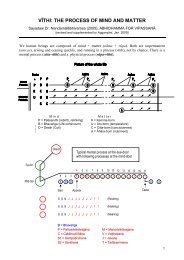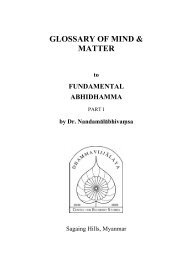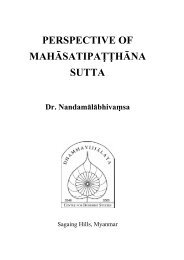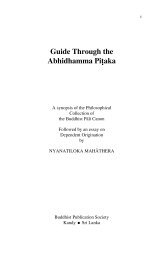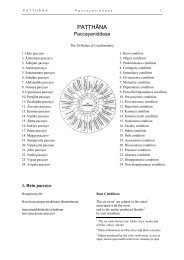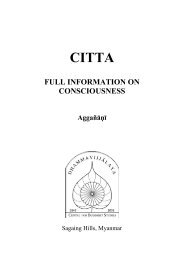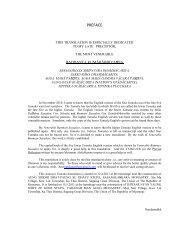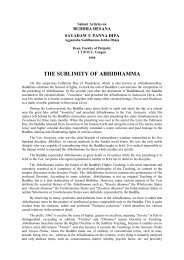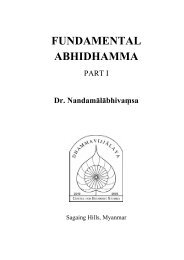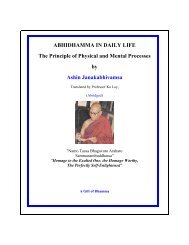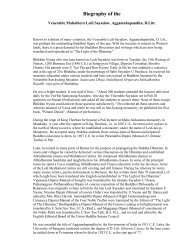Process of Consciousness and Matter - Abhidhamma.com
Process of Consciousness and Matter - Abhidhamma.com
Process of Consciousness and Matter - Abhidhamma.com
You also want an ePaper? Increase the reach of your titles
YUMPU automatically turns print PDFs into web optimized ePapers that Google loves.
INTRODUCTION<br />
sometimes neutral. The cittas <strong>and</strong> their con<strong>com</strong>itant cetasikas are<br />
continuously arising <strong>and</strong> passing away, millions <strong>of</strong> times a second 1 . It<br />
is not possible for the mundane mind to underst<strong>and</strong> this ceaseless<br />
mental activity.<br />
In Buddhism the mind is very important: “Mind is the forerunner<br />
<strong>of</strong> all activity, mind is chief, all is mind made” 2 . In order to underst<strong>and</strong><br />
the ceaselessly changing nature <strong>of</strong> the mind one has to develop it in<br />
various ways. The Buddha taught two kinds <strong>of</strong> meditation:<br />
concentration or tranquillity (samatha) <strong>and</strong> insight or underst<strong>and</strong>ing<br />
(vipassanā). If one practices samatha one’s mind be<strong>com</strong>es pure <strong>and</strong><br />
concentrated. Only with a concentrated mind can one see things as<br />
they truly are, this is the insight <strong>of</strong> vipassanā. We can here draw an<br />
analogy with the modern scientist (say a biologist or physicist), who<br />
needs special equipment in order to do his work. Thus a biologist may<br />
need a microscope, or a physicist may need a particle accelerator.<br />
They need this equipment in order to effectively <strong>and</strong> systematically<br />
study within their respective domains - <strong>of</strong> organic <strong>and</strong> inorganic<br />
matter. In a similar way the student <strong>of</strong> the fundamental realities<br />
spoken <strong>of</strong> in the <strong>Abhidhamma</strong> must have a “tool” <strong>and</strong> that tool is none<br />
other than the student’s own highly concentrated mind. To that end the<br />
student <strong>of</strong> the <strong>Abhidhamma</strong> must make considerable effort to train,<br />
develop <strong>and</strong> purify the mind. This effort must be all en<strong>com</strong>passing,<br />
<strong>and</strong> the Buddha spoke <strong>of</strong> three aspects: morality (sīla), concentration<br />
(samatha) <strong>and</strong> wisdom (paññā). Without effort in all these areas it is<br />
not possible to attain the final liberation <strong>of</strong>fered by vipassanā.<br />
Mind <strong>and</strong> <strong>Matter</strong><br />
The <strong>Abhidhamma</strong> deals in detail with all mental <strong>and</strong> material<br />
phenomena <strong>and</strong> their interdependence. In Western philosophy there is<br />
no detailed treatment <strong>of</strong> consciousness as a separate entity, instead it is<br />
spoken <strong>of</strong> in terms <strong>of</strong> the way the brain uses consciousness. Even<br />
modern Western psychology does not tackle the nature <strong>of</strong><br />
consciousness itself but instead is limited to the study <strong>of</strong> behaviour (be<br />
it human or animal).<br />
3




